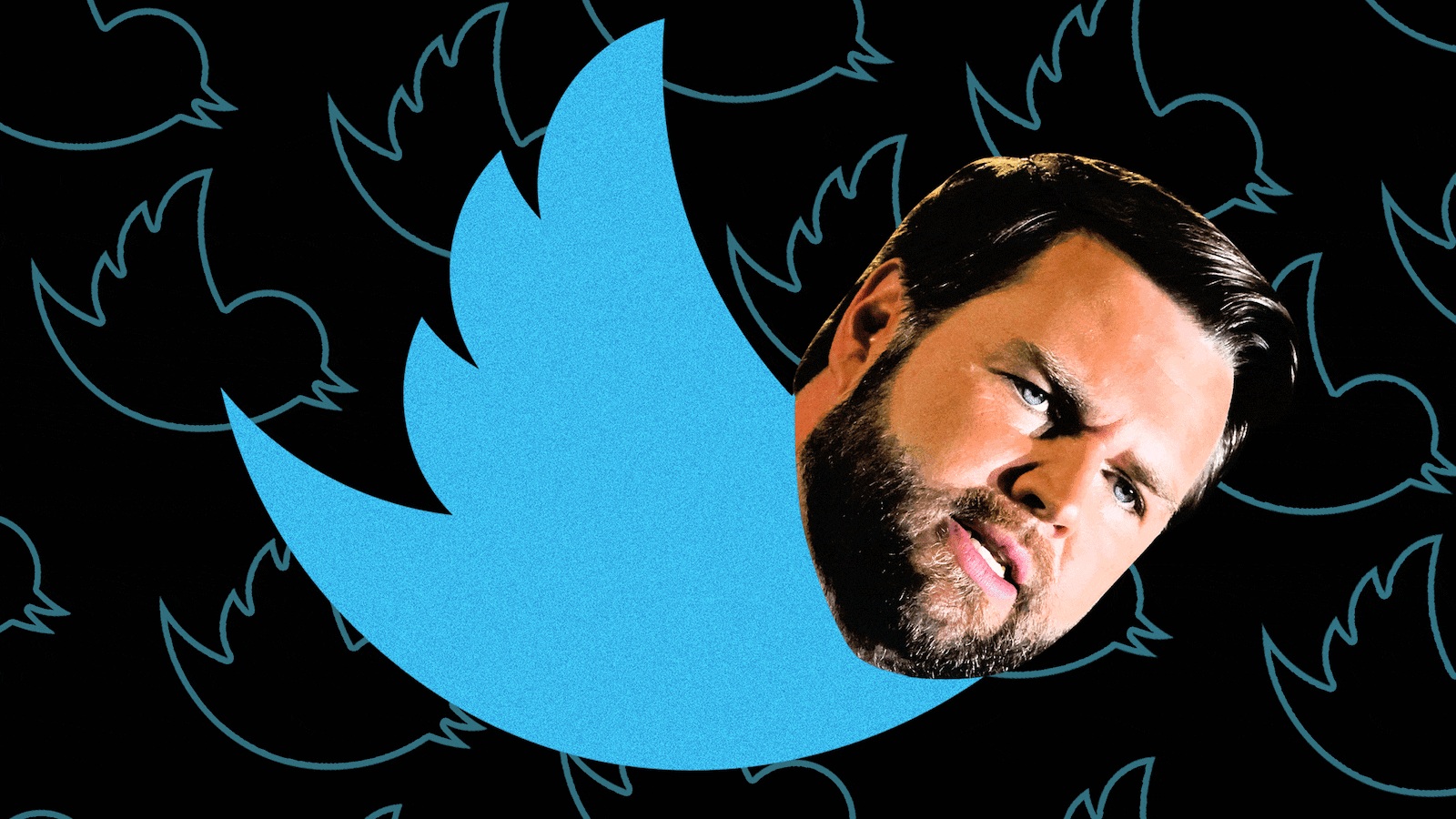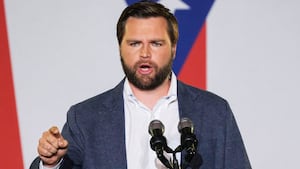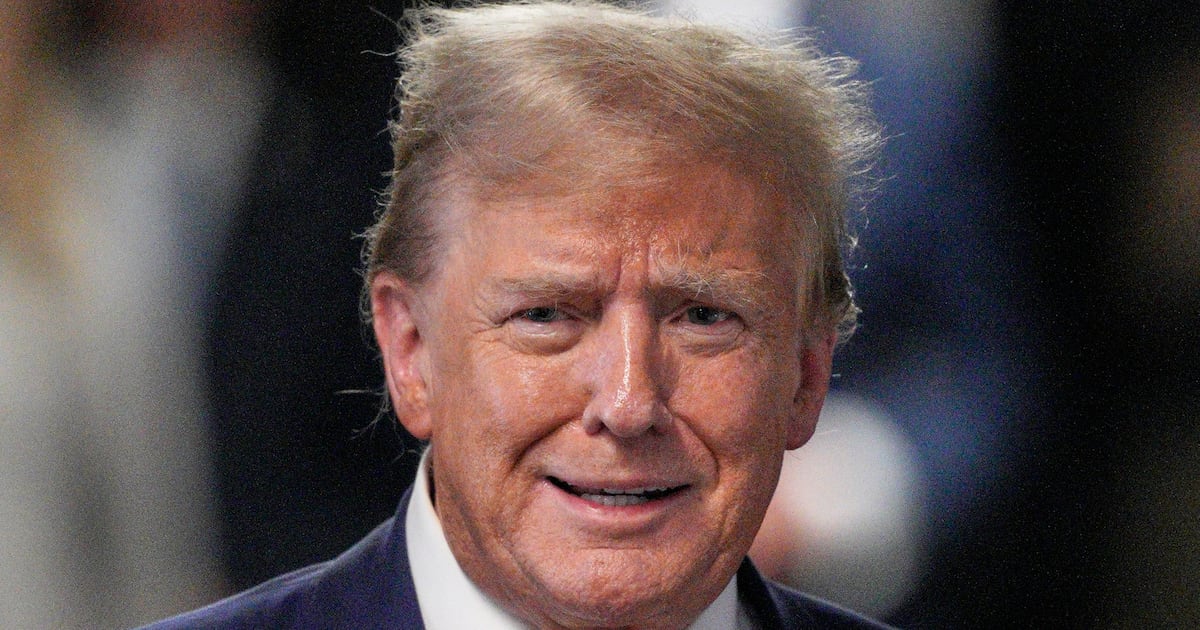In advance of announcing his run for Senate, Hillbilly Elegy author turned venture capitalist J.D. Vance deleted dozens of old tweets blasting former President Donald Trump. But Vance, who is warring with fellow Ohio Republicans for the MAGA vote, forgot to scrub one Twitter element of his anti-Trump past: his “likes.”
Vance’s Twitter likes, which were still visible as of Monday afternoon, include two tweets supporting Hillary Clinton’s 2016 candidacy, a post implying Trump supporters are antisemitic, and multiple tweets indicting Trump’s character. One tweet even accuses then-candidate Trump of sexual assault, and another calls him “psychologically disturbed.” He also liked two tweets mocking Melania Trump.
Most of the controversial Twitter likes came around the time of the leaked “Access Hollywood” tape in early October 2016, where Trump was caught on microphone saying he could grab women by their genitals with impunity because, “When you’re a star, they let you do it.”

On Oct. 8, 2016—the day after the video leaked—Vance liked a tweet calling Trump a “thug” who “[committed] sexual assault.” The post compared Trump’s behavior to his false allegations against a group of Black teenagers in New York in the 1990s.
“Maybe the Central Park 5 could take out a full-page ad to condemn the coddling of thug real estate barons who commit serial sexual assault,” the tweet, from Washington Post columnist Radley Balko, said.
(At the time of the Central Park 5 allegations, Trump purchased a full-page advertisement in The New York Times calling for the death penalty for five minority youths who were convicted of assaulting and raping a white woman. Those teenagers later had the charges vacated after someone else admitted to the crimes. Trump still has never retracted his accusations or apologized, despite the group’s exoneration.)
Vance also liked a tweet from that same day announcing that the Beckley Register-Herald—a newspaper in the heart of West Virginia coal country—had endorsed Clinton. Vance’s like was one of 20 for the tweet.
The investment banker and Yale Law grad also liked yet another tweet from that day, declaring that “Trump is making the GOP the latest victim of his bankrupted endeavors,” and linking to a Business Insider article headlined, “Donald Trump is on the Verge of Poisoning the Entire GOP Brand for Years.”
The “Access Hollywood” tape appeared to have a galvanizing effect on Vance, where he finally felt safe celebrating his anti-Trump beliefs. On that day, Vance liked tweets calling out the hypocrisy of the party of “family values” supporting Trump.
One tweet said, “It is the sexual ethics of men like Trump that is largely responsible for the broad undermining of marriage and family.” Another post that Vance liked read, “Does any Dad (or future Dad) want to look his daughter in the eye and explain why he voted for Trump instead of the 1st woman president?”
Vance was also one of 15 other Twitter users who liked a tweet from that day asking, “If 16 GOP U.S. senators have renounced Trump, why are the other 38 being so damn quiet?”

Vance didn’t quit with the likes on Oct. 8. The next day, Vance also liked a post from ESPN writer Tom Junod, which called Trump “psychologically disturbed” and incapable of conceding mistakes.
A few days later, he signaled his approval for an Oct. 12 tweet from ProPublica’s Alec MacGillis knocking Republican officials who had denounced Trump after the “Access Hollywood” leak, then turned around and re-endorsed him.
“So if you endorsed Trump, then un-endorsed him over the video, then re-endorsed him, can you un-endorse again?” MacGillis wrote. “Asking for a political party.”
Vance’s personal political arc reflects that flip-flop, going from a brash “Never Trump” critic to an outspoken ally. Over the last few months, he’s dialed up the pro-Trump volume as he prepared to make the plunge into the race to replace outgoing Sen. Rob Portman (R-OH), vying against a cramped field of Republican hopefuls that has resulted in a sort of “race to the bottom” to win over Trump’s base.
In response to a request for comment on Vance’s Twitter likes, his campaign spokesperson, Taylor Van Kirk, issued this statement:
“JD being critical of Trump in 2016 has been covered to death—it isn’t exactly breaking news. JD voted for Trump in 2020 and has been a strong supporter of his for several years. The leftwing media is obsessed with attacking JD for the same thing over and over because he is a real threat to Washington DC’s corrupt ruling class. They would much rather talk about irrelevant ‘likes’ from 5 years ago than his plans to break up Big Tech monopolies and raise taxes on woke corporations that ship our jobs overseas.”
(Vance’s run for Senate is supported by tech billionaire Peter Thiel, who has already dropped $10 million for a super PAC backing Vance.)
Since he’s started running, Vance has tried to reinvent himself as an edgy, online conservative. He’s lambasted the “degenerate liberals” on Twitter, asked whether New York is more like season one of The Walking Dead, or season four, and shamelessly changed his tune on Trump to win over voters who are still devoted to the former president.
But in 2016, Vance liked a tweet implying that those same voters were antisemitic.
In preparation for the primary brawl, Vance tried to purge his social media past. Just ahead of his announcement he deleted a number of anti-Trump posts, including sharp rebukes after the “Access Hollywood” video. Many of his deleted tweets, however, were recovered by CNN’s KFile.
While a number of the “liked” tweets archived by The Daily Beast came in October, Vance’s criticism wasn’t limited to that month or the “Access Hollywood” tape. On Feb. 26, 2016, for instance, he liked a post from journalist David Mastio quoting a Washington Post op-ed headline which said, “we all have to stop” Trump. He appears to be the only person who liked that tweet.
Vance also appears to have had some laughs at former first lady Melania Trump’s expense. On the heels of her plagiarism scandal—when she delivered remarks at the Republican National Convention lifted from former first lady Michelle Obama’s speech at the Democratic convention eight years prior—Vance hit the like button on two tweets mocking her speech.
“The longer draft of the speech had Melania talking about her husband's career as a community organizer,” read one of the tweets. The other tweet liked by the self-styled champion of Appalachia’s poor, white communities featured a photo of Melania Trump captioned, “It wasn’t easy growing up a black woman in Chicago, but I believe the world is safer for my 2 girls, Sasha & Malia.”








